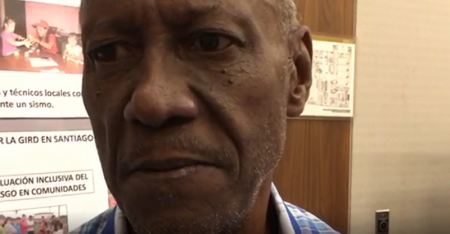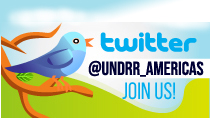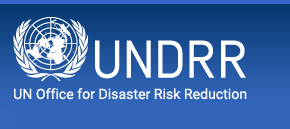- Our Mandate
- Mission and Objectives
- UNDRR in the UN
- Work Programme & Annual Reports
- Results Based System
- Work Partnerships
- Headquarters - Geneva
- SG-UN representatives for DRR
- Regional Office – The Americas and the Caribbean
- Head of the Regional Office – The Americas and the Caribbean
- What is Disaster Risk Reduction?
- What is the International Strategy?
- History of UNDRR
Americas DRR Platform focus on inclusion
 Tichico Joel Cobian Mena, President of the Association of Blind and People Living with Disabilities (ANCI) in Santiago de Cuba, Cuba
Tichico Joel Cobian Mena, President of the Association of Blind and People Living with Disabilities (ANCI) in Santiago de Cuba, Cuba
By Brigitte Leoni
CARTAGENA, 19 June 2018 – Tichico Joel Cobian Mena was a geologist for 26 years in Santiago de Cuba when he became blind in 2005 after a long and painful ocular disease. He is now retired but he has put both his knowledge and handicap at the service of the 10,000 disabled people who have been identified among the most vulnerable groups if his region was hit by an earthquake.
"I am now the President of the Association of Blind and People Living with Disabilities (ANCI) in Santiago de Cuba and we are working very closely with communities and disaster managers to help vulnerable people to better understand their risk and to build the necessary awareness within communities so fewer disabled people will be affected by disasters in the future," said Mr Mena.
Tichico was not born when Santiago de Cuba was last hit by an earthquake in 1932, killing 25 people and damaging 80 per cent of his city, but he knows that at the time communities were not as prepared as they are today.
"This time we know what to do. Disabled people are informed and people living in our communities know who the disabled are, where they live and [how] to assist them if a disaster is happening.
"We have done many drills and managed to integrate their specific needs in the early warning system chain and evacuation plans, so fewer disabled people will be in danger when the next earthquake hits," said Tichico with confidence.
"And I will have a better chance to survive," he adds.
Tichico is in Cartagena Colombia, attending the sixth Regional Platform for Disaster Risk Reduction and he is very proud to share and show the activities of his association and his community to the rest of the region.
"It is very important to sensitize communities and to be able to manage inclusiveness so more vulnerable groups such as the elderly, children and disabled people will be integrated in disaster risk reduction policies," said Ibia Vega Cuza from ACLIFIM, partner of Handicap International which supports the work of ANCI.
"This is part of the policy of our government to better protect people against all kinds of disasters and to manage risk instead of just dealing with disasters," said Mr Cuza.
The Sendai Framework – the global plan for reducing disaster losses by 2030 – calls for a broader and a more people-centred approach to disaster risk management and calls on governments to engage with persons with disabilities in the design of policies, plans and standards.
Related links
Sendai Framework for Disaster Risk Reduction
Follow the UNDRR news online :
 Now we have twitter account @UNDRR Américas y el Caribe
Now we have twitter account @UNDRR Américas y el Caribe
JOIN US!
Tweets por el @UNDRR Américas y el Caribe
